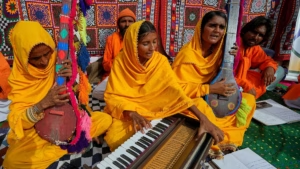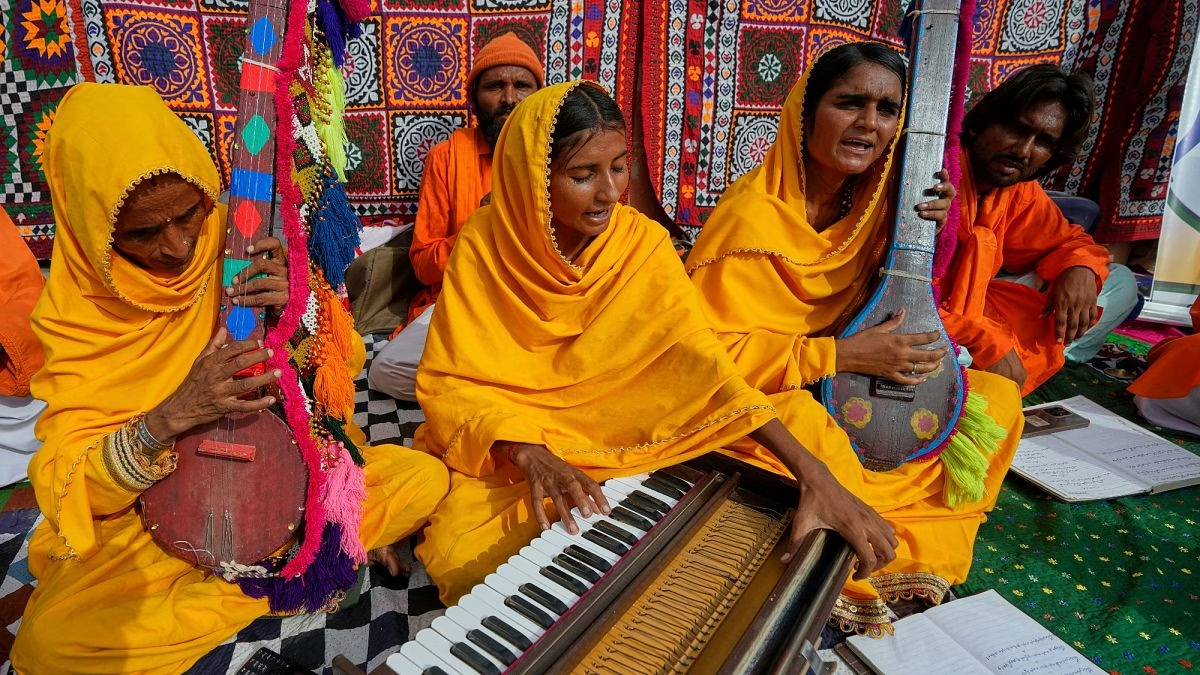
ADVERTISEMENT
Sham Bhai’s singing brings the village to a standstill. Her voice, clear and steady, floats through the dusty pathways and earthen homes, carried by the same winds she sings about – winds that now arrive earlier, stronger, and hotter.
“We are the people of the south,” she sings in Sindhi, her native language. “The winds seem to be coming from the north. The winds seem both cold and warm. My heart is burnt from seeing the houses collapse in the rain. Oh, beloved, come home soon.”
Sham, at 18, is more than a singer. She’s at the forefront of a movement of women using music – both traditional and modern – to raise awareness about climate change in Pakistan’s most vulnerable areas.
Born in Sindh, the province most affected by the 2022 floods that submerged entire communities and displaced millions, she’s spent the past two years traveling from village to village, turning climate science into song.
“When we convey a message through song, it is easy to communicate to people because they understand it,” explains the young singer.
Joined by two other singers, she begins every performance with well-known, lively tunes – a tactic she uses to attract the audience – before gradually transitioning to melancholic ballads about flooding, displacement, and climate sorrow.
And her music is making a difference: “People are heeding our advice; they are planting trees and reinforcing their homes to combat climate change,” stated Sham. “Women and children endure a great deal during adverse conditions, which damage their homes.”
Rap as a means of protest
While Sham draws on centuries-old folk traditions, rapper and activist Urooj Fatima, known as Sindhi Chhokri, uses hip-hop to deliver her message.
“We can engage a larger audience with rap. If we gather a village community, there can be a maximum of 50 people. But everyone listens to songs. Through rap, we can reach hundreds of thousands of people with our voice and message” she says.
Urooj turned to music after witnessing her own home being destroyed by flooding – once in 2022, then again in 2024. In a country where hip-hop is still a niche genre and female rappers are almost unheard of, she’s created a platform by addressing taboo issues: women’s rights, corruption, climate injustice.
Her most impactful track – created following the 2022 deluge in neighboring Balochistan – does not shy away from political critique: “There are potholes on the road; the roads are ruined,” Urooj raps. “I am telling the truth. Will your anger fall upon me? Where was the Balochistan government when the floods came? My pen thirsts for justice. Now, they have succeeded, these stealing rulers. This isn’t a rap song, this is a revolution.”
The song, performed at festivals and widely shared on social media, put her on the map. She now dedicates herself full-time to campaigning alongside her sister, Khanzadi, planting trees, visiting isolated communities, and urging local governments to take further action.
Climate change, she asserts, affects women the most. They are the ones collecting water, managing livestock, nurturing children, dealing with displacement. And when a disaster strikes, they are the first to go hungry and the last to be heard.
“For women, there are no opportunities or amenities. And then, if a flood comes from above, they face even more challenges.”
In rural Sindh, where the literacy rate is around 38%, music has become essential for raising awareness about climate change. It transcends language barriers – such as the fact that most people here speak Sindhi, not Urdu – and delivers vital information in a way that is relatable and memorable.



